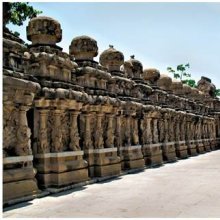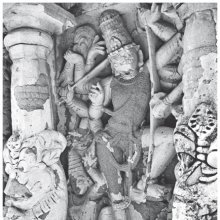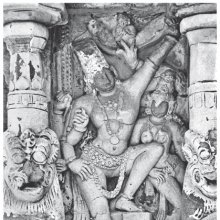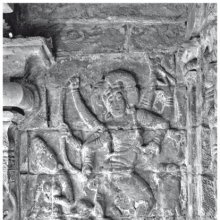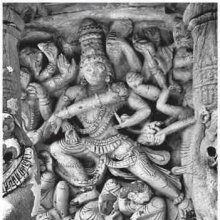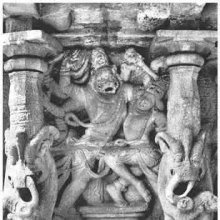Mura: 20 definitions
Introduction:
Mura means something in Hinduism, Sanskrit, the history of ancient India, Marathi, Jainism, Prakrit, biology. If you want to know the exact meaning, history, etymology or English translation of this term then check out the descriptions on this page. Add your comment or reference to a book if you want to contribute to this summary article.
Mura has 18 English definitions available.
Images (photo gallery)
(+65 more images available)
Languages of India and abroad
Sanskrit dictionary
[Deutsch Wörterbuch]
Source: Cologne Digital Sanskrit Dictionaries: Böhtlingk and Roth Grosses Petersburger WörterbuchMura (मुर):—
1) m. Nomen proprium eines Mannes gaṇa kurvādi zu [Pāṇini’s acht Bücher 4, 1, 151.] Name eines von Kṛṣṇa erschlagenen Daitya [Hemacandra’s Abhidhānacintāmaṇi 220.] [Medinīkoṣa r. 78.] [Mahābhārata 5, 1890. 5357. 7, 386.] [Harivaṃśa 8395] (wo mit der neueren Ausg. murasyā st. parasyā zu lesen ist). [Bhāgavatapurāṇa 3, 3, 11.] Vgl. madhumuranarakavināśana, muru, maurya . —
2) f. ā a) eine best. wohlriechende Pflanze (nach dem Daitya benannt; vgl. 2. daitya 2,a.) [Amarakoṣa.2,4,4,11.] [Medinīkoṣa r. 69. 78.] — b) angeblich Nomen proprium der Gattin Nanda's und Mutter Candragupta's (vgl. maurya) [Viṣṇupurāṇa 469,] [Nalopākhyāna 21.] —
3) n. das Umfangen (vgl. 2. mur) [MATHUR.] zu [Amarakoṣa] [Śabdakalpadruma]
--- OR ---
Mūra (मूर):—
--- OR ---
Mūra (मूर):—2. (von mū = mīv) adj. drängend, stürmisch: susaṃmṛṣṭāso vṛṣa.hasya mū.āḥ (Indra's Rosse) [Ṛgveda 3, 43, 6.] = māraka [Sāyaṇa]
--- OR ---
Mūra (मूर):—
Source: Cologne Digital Sanskrit Dictionaries: Sanskrit-Wörterbuch in kürzerer FassungMura (मुर):——
1) m. Nomen proprium eines von Viṣṇu-Kṛṣṇa erschlagenen Daitya. muraṃ vidviṣant m. Beiname Visṇu’s [Naiṣadhacarita 8,95.] —
2) f. ā — a) eine best. wohlriechende Pflanze [Rājan 12,139.] [Bhāvaprakāśa 1,191.3,30.101.] — b) Nomen proprium der Mutter Kanuragapta's. —
3) n. das Umfangen.
--- OR ---
Mūra (मूर):—1. Adj. (f. ā) stumpfsinnig , blöde , dumm.
--- OR ---
Mūra (मूर):—2. Adj. drängend , stürmisch. Nach [Sāyaṇa. ] = māraka.
--- OR ---
Mūra (मूर):—3. n. = mūla. Wurzel.
Sanskrit, also spelled संस्कृतम् (saṃskṛtam), is an ancient language of India commonly seen as the grandmother of the Indo-European language family (even English!). Closely allied with Prakrit and Pali, Sanskrit is more exhaustive in both grammar and terms and has the most extensive collection of literature in the world, greatly surpassing its sister-languages Greek and Latin.
See also (Relevant definitions)
Starts with (+258): Mura-amure, Mura-awuda-rajakariya, Mura-awudaya, Mura-palleru, Mura-saki-mukashi-yomogi, Muraa, Muraagwa, Murabamungu, Murabat-baitti, Murabatte, Murabba, Murabbi, Murabhid, Muracai, Muracaketanan, Muracaketu, Muracakkotiyon, Muracal, Muracam, Muracamga.
Ends with (+25): Amura, Apramura, Atmura, Bhale-timura, Camura, Caramura, Chimura, Churmura, Cimura, Curamura, Gandila bamura, Hanuman mura, Hanumanmura, Haymura, Jhuramura, Juramura, Kamimura, Kenmura, Kolmura, Kukulamurmura.
Full-text (+134): Mur, Muraripu, Murari, Murajit, Maurya, Murahan, Murabhid, Muradvish, Muradeva, Muramardana, Murada, Amura, Rojamara, Utkhala, Talakhya, Muravairin, Gandhamalini, Murarimishriya, Madhumuranarakavinashana, Muraganda.
Relevant text
Search found 51 books and stories containing Mura, Murā, Mūra, Mur; (plurals include: Muras, Murās, Mūras, Murs). You can also click to the full overview containing English textual excerpts. Below are direct links for the most relevant articles:
Rig Veda (translation and commentary) (by H. H. Wilson)
Puranic encyclopaedia (by Vettam Mani)
Hari-bhakti-kalpa-latikā (by Sarasvati Thkura)
Women in the Atharva-veda Samhita (by Pranab Jyoti Kalita)
30. Goddess Yātudhānī < [Chapter 4 - Female Deities and the Glorification of Women in the Atharvaveda]
Garga Samhita (English) (by Danavir Goswami)
Verse 4.8.11 < [Chapter 8 - In the Story of the Yajña-sītās, the Glories of Ekādaśī]
Verse 2.24.16 < [Chapter 24 - The Story of Asuri Muni in the Rāsa-dance Pastime]
Verse 8.13.48 < [Chapter 13 - A Thousand Names of Lord Balarāma]
Sahitya-kaumudi by Baladeva Vidyabhushana (by Gaurapada Dāsa)
Related products
